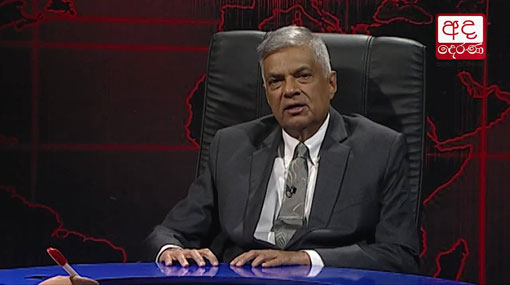Maithripala Sirisena is a decision I don’t regret – PM
January 30, 2018 11:14 am
Providing an exclusive interview to Ada Derana 360, Prime Minister Ranil Wickremesinghe spoke on the current situation within the government, his relationship with President Maithripala Sirisena and the economic plans for the future.
Q – Has the dissention within the government affected the ability of the cabinet to make unanimous decisions?
“The UNP and SLFP made a decision to come together in 2015 with several other parties to ensure that all economic and administrative decisions will be made with greater insight. Unlike in the past, securing a unanimous decision is complex as both parties have differing ideologies. Though both parties have differing policies our objective has always remained the same. Thereby we will continue to take our decisions together”.
Q – Opposition members have continued to lament over an apparent ‘economic crisis’. Are these allegations true and what has the government done to prevent such a situation?
“When we took over in 2015 when the country was in crushing debt. The previous regime had irresponsibly taken loans exceeding 9-10 million USD. To restructure the economy after such an irresponsible reign was indeed a telling task, however through careful planning and a united effort we stabilized the economy to have the means to repay the loans that were taken”.
“Our primary aim was to develop the economy and increase revenue streams so that we could channel more funds towards the repayment of loans. As a result of our ideology we have increased revenue streams and made the country an attractive location for foreign investment recording the highest number of FDI in history within the last year. We are now in a position to repay the loans that were taken and by 2025 we can completely stabilize the economy. The strategy adopted by the government will have long-term benefits.”
Q – Do you feel that a UNP government would have been easier in administration?
“Our ambition in 2015 was to create an inclusive and united government so that we will have greater perspective as a governing body. Having a one-party government would be more practical but countries like Germany have shown that two parties can coexist. Even though the SLFP and UNP may not agree on every decision together, no major decision has been severely condemned by either side.”
Q – Has the delay in decision making adversely affected the public?
“The government will remain committed to making carefully planned decisions as opposed to rash and misinformed ones. We do not believe in quick fixes that will please the public but in sustainability and cohesion.”
Q – In 2015 you made a decision to step down as the UNP Presidential candidate to enable President Maithripala Sirisena to contest as the common candidate. Do you regret your decision?
“In 2015 several parties including the JVP united to contest against the previous regime. In doing so there was a common consensus that a common candidate would be required to galvanize the people. The President graciously accepted the task leading to our ultimate victory. Looking back I do not regret our decision as together we have been able to achieve our ambition as a coalition government.
Q – Several government SLFP members have publicly criticized your decisions. Does this reflect the opinion of the President?
“Contrary to the opinion of the opposition, the President and I have always remained united. When an election draws near politicians always attempt to gain public favour by slandering their opponents. I advised the members of the UNP to refrain from criticizing the President as he is the head of our government”.
Q – Susil Premajayantha stated that the Local Government election will be akin to a referendum. If the UNP cannot secure the majority, can the President form his own government?
“Following the Local government election the administrative posts cannot be changed. Even though the SLPP has relentlessly addressed a regime change Mahinda Rajapaksa cannot be appointed as the Prime Minister. Not even the President has the power to do so. The UNP will always look to form alliances with other parties therefore no major change will occur.”
Q – The President stated that he requires your assistance to capture the criminals of the past. Is it true that you have not aided him in his quest for justice?
“The President and government made a pledge to the people that we will apprehend all the criminals involved in major crimes during the Rajapaksa regime. There are currently over 120 pending major cases at the Attorney General’s Department. Upon discussion we realized that we do not have the necessary infrastructure or personnel to expedite these major cases. As a solution we decided to introduce 3-4 new High Courts that will be set up in the near future. Facilitating these Courts is not an easy task as each Court will require additional lawyers, judges and policemen capable of administering a High Court. Once these new legal reform are introduced we will be able to speed up the justice system”.
Q – Several allegations have been levied against the Rajapaksa family over offshore accounts with illicit money. Has the government found credible evidence to support this claim?
“The government has been able to recover credible evidence that will assist our future investigation. Such a large scale investigation will not be easy as our officials will have international boundaries to overcome. We are confident however that we will make a breakthrough.”












